Regulation of International Financial Markets and International Banking
The research group ‘Regulation of International Financial Markets and International Banking’ analyses international capital flows as well as the consequences of regulatory changes for financial stability and intermediation. Both aspects can facilitate an efficient allocation of capital and enable risk sharing, but spark at the same time global financial instabilities. Banking regulation and supervision has accordingly changed significantly over recent years, but the impact of these comprehensive reforms on the functionality of the financial system remain unclear. In addition banks face further challenges, such as tightening monetary policy, geopolitical risks, and the emergence of new competitors due to digitalization.
Against this backdrop, the research group contributes to the literature in three ways. First, the group empirically analyses international capital flow determinants and the implications for financial stability and credit allocation. Periods characterised by a high degree of financial integration are often followed by financial crises, causing negative spill-overs to the real economy. This work package seeks to advance our understanding of how to maintain a stable banking system that is able to efficiently channel financial resources to firms and households alike.
Second, the group analyses the impact of changes in banking supervision and regulation on (inter)national activities of banks with a specific focus on the European integration process. The establishment of the European Banking Union constantly shapes the banking sector as prudential and regulatory responsibilities are transferred from the national to the Euro area level. Integrated markets allow for an early detection of soaring risks at an early stage, but new regulations can also create distortions. This work package contributes to the scant empirical evidence on this trade-off.
Third, “traditional” banks are not only operating in a tighter regulatory framework, they also face plenty of challenges threatening their business model and longer-term profitability. For example, increasing interest rates sparked deposit withdrawals and valuation losses of banks’ fixed income investment. Distortions due to the realization of political risks and rising levels of public, private, and corporate debt might bear the risk of future non-performing loans. The emergence of non-bank financial intermediaries (FinTech) challenge current business models of banks. The consequences for banks or their new competitors should be monitored.
Workpackage 1: The Shape of International Financial Markets
Workpackage 2: Evaluation of Regulatory Policies in Integrated Markets
Workpackage 3: Financial Intermediation in a Changing World
IWH Data Project: International Banking Library
The International Banking Library is a web-based platform for the exchange of research on cross-border banking. It provides access to data sources, academic research, both theoretical and empirical, on cross-border banking, as well as information on regulatory initiatives. The International Banking Library addresses researchers, policymakers, and students of international banking and economics in search of comprehensive information on international banking issues.
The contents of the International Banking Library are summarised and distributed in a quarterly newsletter, thereby adding to the international visibility of the IWH (with more than 700 subscribers from academia, central banks and the industry) and facilitating a regular exchange of our research ideas with policy makers.
IWH Data Project: Financial Markets Directives Database
In Europe, financial markets have undergone significant regulatory changes since the last financial and sovereign debt crisis. One key element is the harmonisation of rules for capital regulation, bank resolution and deposit insurance. In the euro area, the sizable change in the regulatory framework is also reflected by the establishment of the European Banking Union.
Another change that might have implications for financial structure is the establishment of a Capital Market Union. Evidence-based policymaking and the evaluation of (un-)intended consequences of such reforms needs information on when regulatory changes happen. In the European Union, the cornerstones of regulatory changes that apply to all member states are implemented by means of regulations or directives. The latter ones have to be implemented, with some scope for discretion, into national law by the member states. The Financial Markets Directives Database assembles the dates at which countries have published the key legal document related to several recent directives affecting financial markets.
The cornerstone of the database constitutes information on the European Banking Union including its three directives on capital requirements, bank resolution and deposit insurance (CRD IV, BRRD, DGSD). The database has been made publically available via the website “International Banking Library” and is part of the Centre for Evidence-based Policy Advice (IWH-CEP).
Research Cluster
Economic Dynamics and StabilityYour contact

- Department Financial Markets
EXTERNAL FUNDING
07.2017 ‐ 12.2022
The Political Economy of the European Banking Union
Causes of national differences in the implementation of the Banking Union and the resulting impact on financial stability.
01.2015 ‐ 12.2017
Dynamic Interactions between Banks and the Real Economy
Refereed Publications
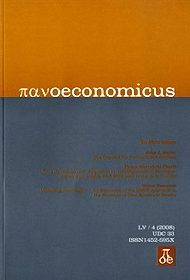
Initial Evidence from a New Database on Capital Market Restrictions
in: Panoeconomicus, No. 3, 2012
Abstract
One of the key obstacles to the empirical analysis of capital controls has been the unavailability of a detailed set of indicators for controls that cover a broad set of countries over a range of years. In this paper, we propose a new set of indicators derived from the Annual Reports on Exchange Arrangements and Export Restrictions. Contrary to most earlier attempts to construct control indicators from this source, our set of indices allows one to analyze the control intensity separately for inflow, outflow and repatriation controls. An additional set of indicators features information on the institutional design of controls. At first glance, the data show that the financial crisis caused a surge in capital market restrictions, most notably concerning the derivatives market. This reflex, which is not justified by the scarce empirical evidence on the success of controls, shows the importance of having a valid measure to allow an econometrically sound policy evaluation in this field. The data are available from the author upon request.
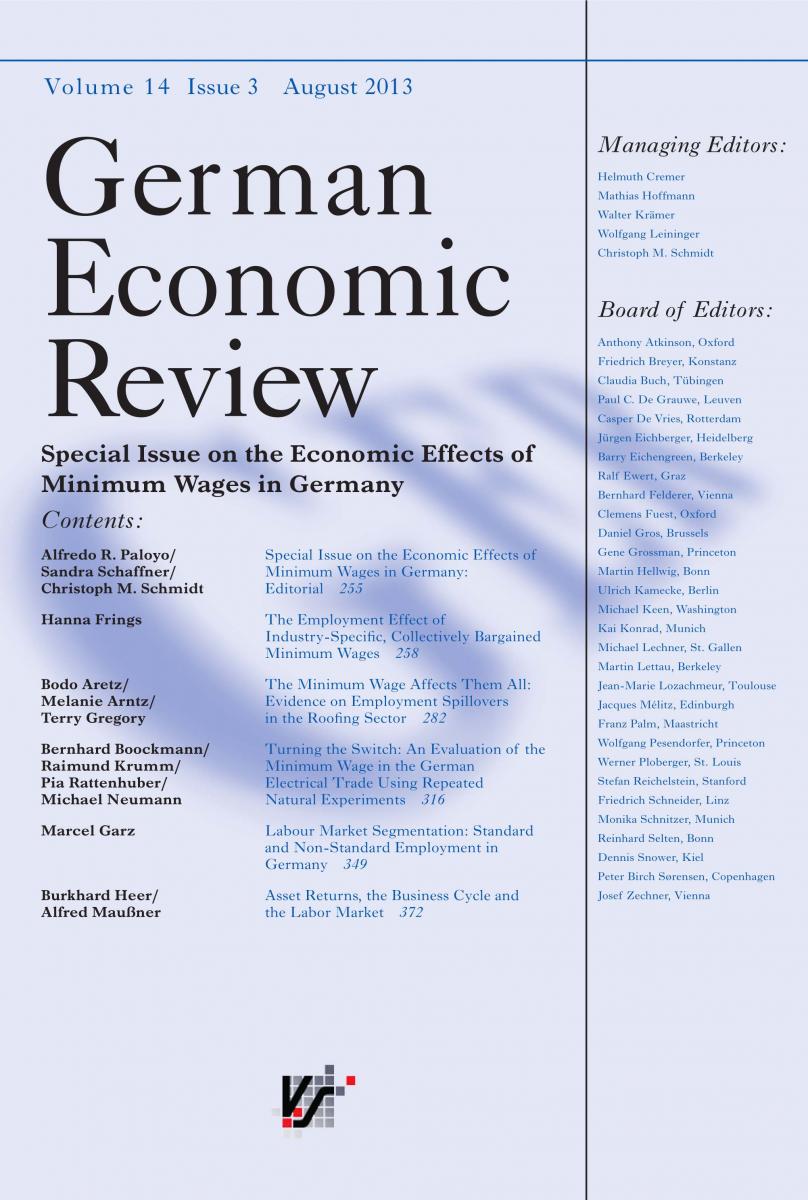
The Distorting Impact of Capital Controls
in: German Economic Review, No. 1, 2012
Abstract
This paper uses panel data to show that capital controls have a significant impact on international interest rate differentials. Various types of controls can be distinguished within the data. The analysis shows that the aforementioned effects of capital controls on interest rates are especially strong in the case of capital import controls on portfolio capital; the implementation of these controls has been suggested in the wake of the Asian Crisis to prevent further crises. The results presented herein contradict the hypothesis that capital controls can achieve a restructuring of the maturity of capital inflows without a distortion in international capital allocation.
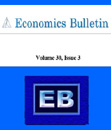
Protect and Survive? Did Capital Controls Help Shield Emerging Markets from the Crisis?
in: Economics Bulletin, No. 1, 2012
Abstract
Using a new dataset on capital market regulation, we analyze whether capital controls helped protect emerging markets from the real economic consequences of the 2009 financial and economic crisis. The impact of the crisis is measured by the 2009 forecast error of a panel state space model, which analyzes the business cycle dynamics of 63 middle-income countries. We find that neither capital controls in general nor controls that were specifically targeted to derivatives (that played a crucial role during the crisis) helped shield economies. However, banking regulation that limits the exposure of banks to global risks has been highly successful.
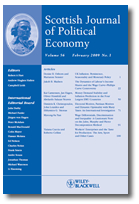
The Impact of Fixed Exchange Rates on Fiscal Discipline
in: Scottish Journal of Political Economy, No. 5, 2011
Abstract
In this paper, it is shown that, contrary to standard arguments, fiscal discipline is not substantially enhanced by a fixed exchange rate regime. This study is based on data from 116 countries collected from 1975 to 2004 and uses various estimation techniques for dynamic panel data, in particular a GMM estimation in the tradition Arellano and Bover (1995) and Blundell and Bond (1998). Contrary to previous papers on this topic, the present paper takes into account that the consequences of a new exchange rate regime do not necessarily fully manifest immediately.
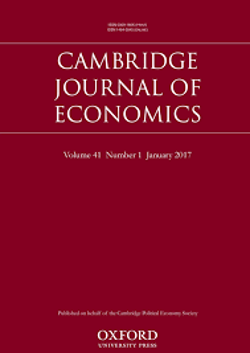
The Role of Rating Agencies in Financial Crises: Event Studies from the Asian Flu
in: Cambridge Journal of Economics, 2010
Abstract
Based on case studies from countries that have been hit hardest by the Asian financial crisis of 1997, the present paper shows that the accusation that sovereign ratings led to a severe acceleration of the crisis is unconvincing and that the empirical method often used to support accusations against rating agencies is inappropriate for the problem under analysis. Rather, it must be emphasised that ratings were downgraded in most countries very shortly before the end of the crisis. In some countries, the ratings were even further downgraded after the end of the crisis as countries started to recover. This is not in line with the thesis that the crisis was accelerated by rating agencies.
Working Papers
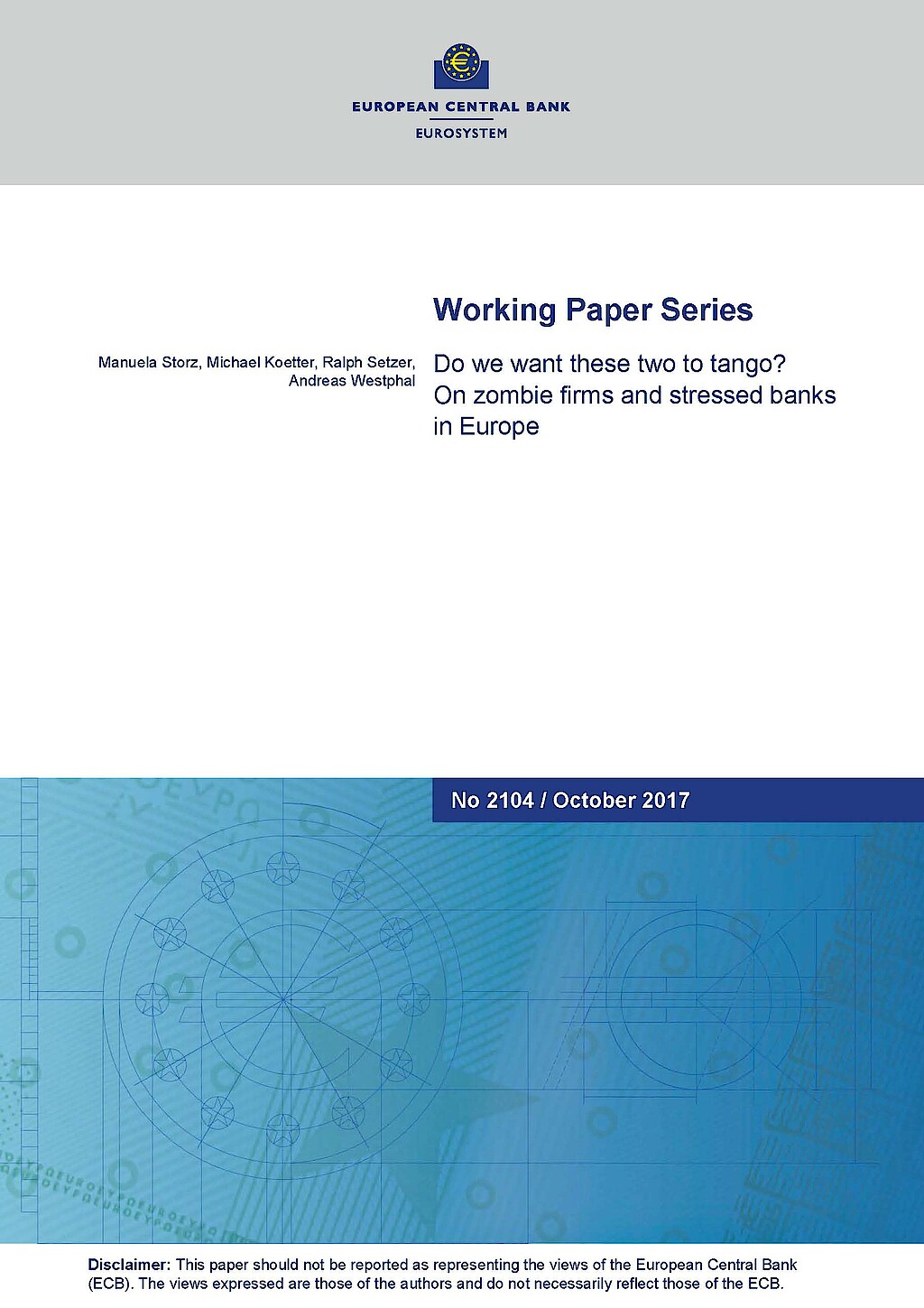
Do We Want These Two to Tango? On Zombie Firms and Stressed Banks in Europe
in: ECB Working Paper, 2017
Abstract
We show that the speed and type of corporate deleveraging depends on the interaction between corporate and financial sector health. Based on granular bank-firm data pertaining to small and medium-sized enterprises (SME) from five stressed and two non-stressed euro area economies, we show that “zombie” firms generally continued to lever up during the 2010–2014 period. Whereas relationships with stressed banks reduce SME leverage on average, we also show that zombie firms that are tied to weak banks in euro area periphery countries increase their indebtedness even further. Sustainable economic recovery therefore requires both: deleveraging of banks and firms.
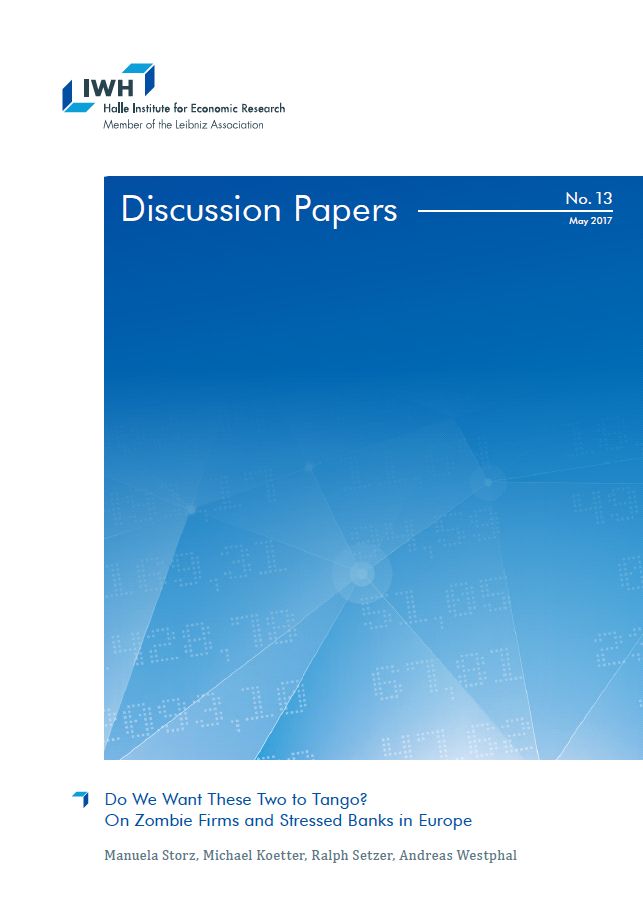
Do We Want These Two to Tango? On Zombie Firms and Stressed Banks in Europe
in: IWH Discussion Papers, No. 13, 2017
Abstract
We show that the speed and type of corporate deleveraging depends on the interaction between corporate and financial sector health. Based on granular bank-firm data pertaining to small and medium-sized enterprises (SME) from five stressed and two non-stressed euro area economies, we show that “zombie” firms generally continued to lever up during the 2010–2014 period. Whereas relationships with stressed banks reduce SME leverage on average, we also show that zombie firms that are tied to weak banks in euro area periphery countries increase their indebtedness even further. Sustainable economic recovery therefore requires both: deleveraging of banks and firms.

Inside Asset Purchase Programs: The Effects of Unconventional Policy on Banking Competition
in: ECB Working Paper Series, No. 2017, 2017
Abstract
We test if unconventional monetary policy instruments influence the competitive conduct of banks. Between q2:2010 and q1:2012, the ECB absorbed Euro 218 billion worth of government securities from five EMU countries under the Securities Markets Programme (SMP). Using detailed security holdings data at the bank level, we show that banks exposed to this unexpected (loose) policy shock mildly gained local loan and deposit market shares. Shifts in market shares are driven by banks that increased SMP security holdings during the lifetime of the program and that hold the largest relative SMP portfolio shares. Holding other securities from periphery countries that were not part of the SMP amplifies the positive market share responses. Monopolistic rents approximated by Lerner indices are lower for SMP banks, suggesting a role of the SMP to re-distribute market power differentially, but not necessarily banking profits.
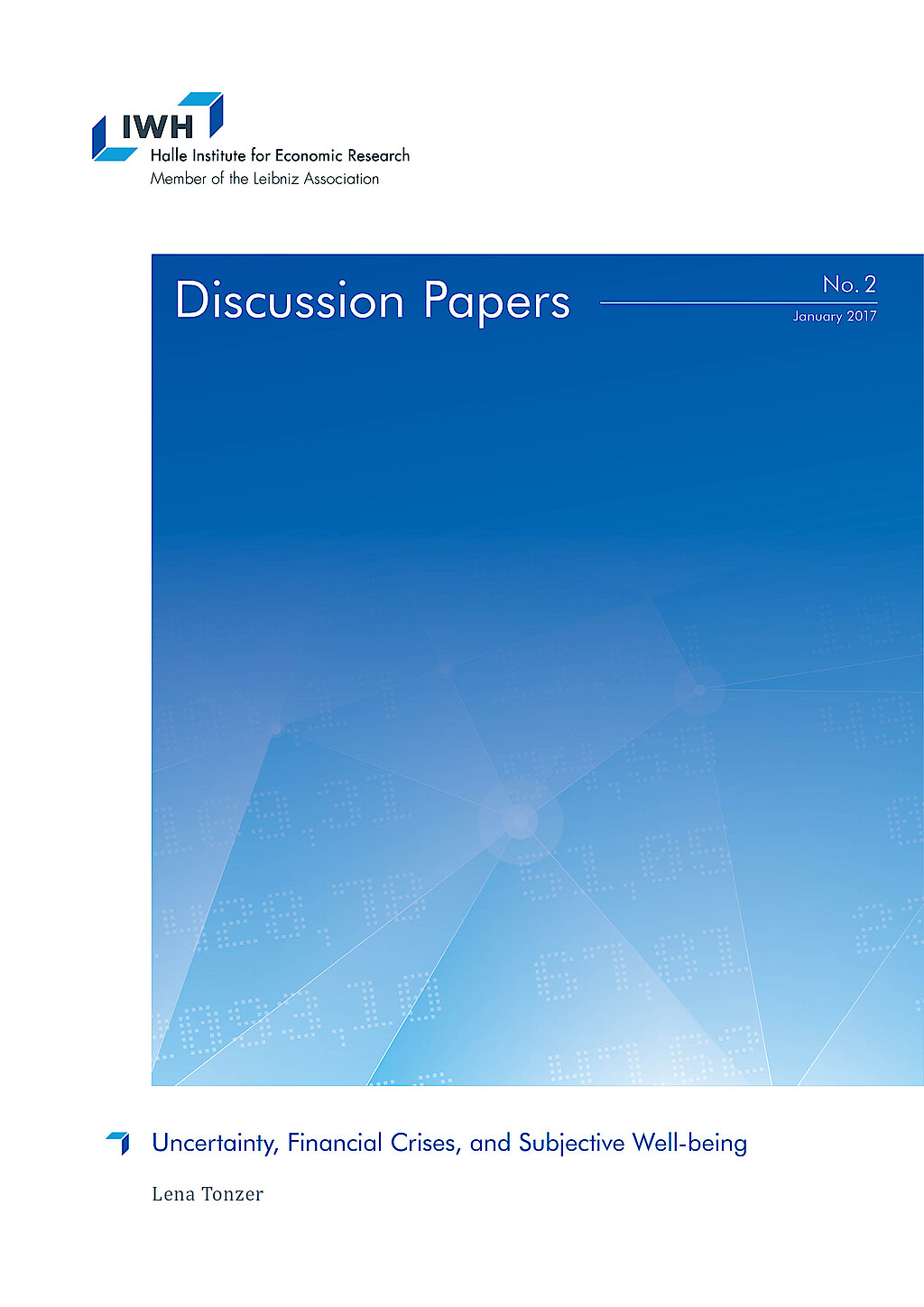
Uncertainty, Financial Crises, and Subjective Well-being
in: IWH Discussion Papers, No. 2, 2017
Abstract
This paper focuses on the effect of uncertainty as reflected by financial market variables on subjective well-being. The analysis is based on Eurobarometer surveys, covering 20 countries over the period from 2000 to 2013. Individuals report lower levels of life satisfaction in times of higher uncertainty approximated by stock market volatility. This effect is heterogeneous across respondents: The probability of being unsatisfied is higher for respondents who are older, less educated, and live in one of the GIIPS countries of the euro area. Furthermore, higher uncertainty in combination with a financial crisis increases the probability of reporting low values of life satisfaction.

To Separate or not to Separate Investment from Commercial Banking? An Empirical Analysis of Attention Distortion under Multiple Tasks
in: IWH Discussion Papers, No. 2, 2016
Abstract
In the wake of the 2008/2009 financial crisis, a number of policy reports (Vickers, Liikanen, Volcker) proposed to separate investment banking from commercial banking to increase financial stability. This paper empirically examines one theoretical justification for these proposals, namely attention distortion under multiple tasks as in Holmstrom and Milgrom (1991). Universal banks can be viewed as combining two different tasks (investment banking and commercial banking) in the same organization. We estimate pay-performance sensitivities for different segments within universal banks and for pure investment and commercial banks. We show that the pay-performance sensitivity is higher in investment banking than in commercial banking, no matter whether it is organized as part of a universal bank or in a separate institution. Next, the paper shows that relative pay-performance sensitivities of investment and commercial banking are negatively related to the quality of the loan portfolio in universal banks. Depending on the specification, we obtain a reduction in problem loans when investment banking is removed from commercial banks of up to 12 percent. We interpret the evidence to imply that the higher pay-performance sensitivity in investment banking directs the attention of managers away from commercial banking within universal banks, consistent with Holmstrom and Milgrom (1991). Separation of investment banking and commercial banking may indeed be associated with a reduction in risk in commercial banking.
















